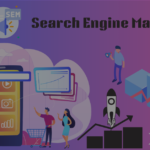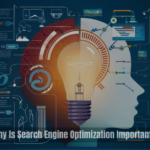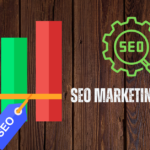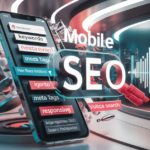Last Updated on June 23, 2025 by janetjacksondigital
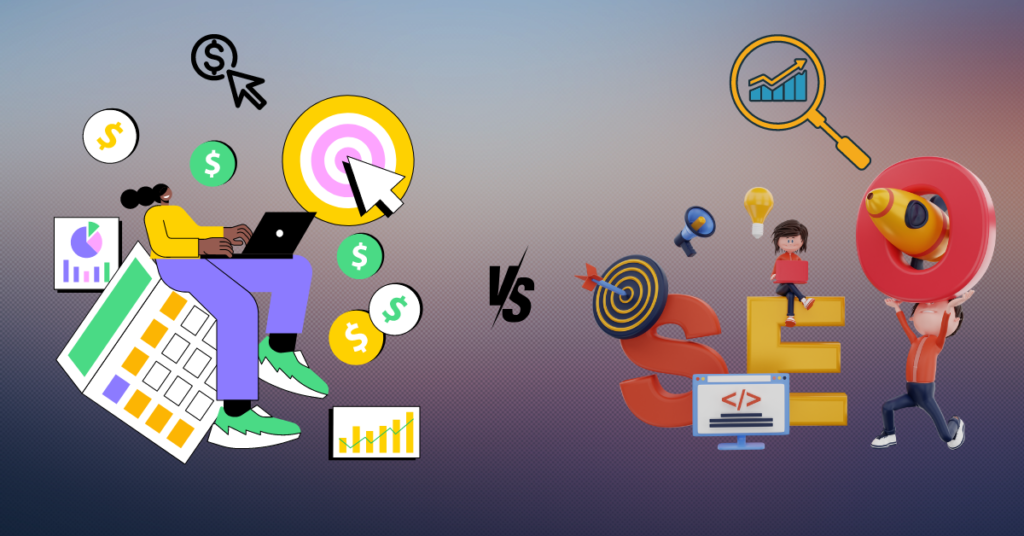
SEO vs. PPC
Increasing web page traffic is the common objective of pay-per-click (PPC) advertising and search engine optimization (SEO). But out of the two, which is a better investment? Sadly, there is no clear winner in the “SEO vs. PPC” argument. Come along as we dissect these strategies, point out their advantages and disadvantages, and assist you in deciding which is best for your company.
What Is SEO?
Optimizing your website to rank higher in search engine results pages is known as search engine optimization (SEO). Bots are utilized by search engines to scour every page of a website and apply intricate algorithms to classify the pages according to variables that are known and unknown. In order to rank web pages higher in search engine results pages (SERPs) and make sure that the content on those pages is relevant and helpful, SEO strategies cater to the known elements in the most advantageous ways.
There are two types of SEO: off-page SEO and on-page SEO. Customizing the content of your web pages itself to improve search engine rankings is known as on-page SEO. For instance, include terms and phrases that your target audience frequently searches for in blog post titles and blog material itself. Off-page SEO is the process of raising your page rankings without making any changes to the content of your website, such when you run a backlink building campaign. More organic traffic—that is, traffic derived from search results rather than advertisements—is the product of good SEO.
SEO Benefits and Drawbacks
Even while getting organic traffic has many benefits, SEO has certain drawbacks. These are some of this strategy’s benefits and drawbacks.
Benefits
- Reduced long-term expenses. When compared to PPC, which charges you each time a user clicks on your link, SEO is less expensive. You may continue to be seen without continuously investing in advertisements when you use SEO.
- Organic traffic is persistent. Constant optimization efforts will allow you to maintain organic traffic from SEO. Following a high ranking in SERPs, these efforts assist you in holding onto that place.
- Elevated trustworthiness of the brand. In order to get good SEO, you must also enhance the experience of your viewers by offering them relevant, educational material. Creating such material gradually enhances your credibility and reputation as well.
Negative
- SEO calls for knowledge. You cannot create and sustain an efficient SEO strategy in a single day. You’ll have to recruit experts that specialize in these tasks or learn the ropes yourself.
- The algorithms used by search engines are subject to change. Page rankings may suddenly plummet as a result of frequent algorithm updates by search engines.
- Regular maintenance is required for your website. Your web pages must be optimized continuously while they are live if you want their rankings to remain stable.
- SEO requires patience to be successful. It may take weeks or months before you see any returns from your diligent SEO effort, depending on a number of things like how competitive your search phrases are or how well you built your website from the ground up.
What Is PPC?
In the pay-per-click (PPC) digital marketing strategy, a company bids to have its ads show up to users searching for particular keywords on search engine pages (SERPs), typically in the premium top position. The company pays the publication the amount it bid when users click on these advertisements. Depending on the terms, competition for the best PPC tools ad positions might be fierce and expensive. The publication will not display your advertisement as frequently or at all if someone else outbids you.
PPC Benefits and Drawbacks
PPC has gained popularity as a marketing approach due to its ability to swiftly increase traffic and visibility; yet, these benefits may come at a significant cost. Think about the benefits of seo and drawbacks of PPC advertising.
Advantages
- first place on the page. Having the top spots on SERPs brings more traffic and conversions, which is the most evident benefit of PPC advertising.
- quick outcomes. PPC produces traffic far faster than SEO since you can just outbid your competitors to take the top page positions.
- More effective targeting. PPC campaigns allow you to pinpoint your target audience with personalized messaging for specific geographic regions, interests, behaviors and more.
- Easy and quick experimenting with ads. PPC advertisements are easy to set up and modify, allowing you to run multiple ads simultaneously with minor tweaks to discover which ones work better.
Negative
- The cost. You get charged each time someone clicks on one of your links. Furthermore, bids for competitive keywords and industries are typically higher, which drives up prices even further. To get results worth it, a PPC campaign will cost you a lot of money.
- Wars of bidding. It’s possible to engage in bidding wars with rivals, which can drastically raise expenses over time.
- The money determines how visible you are. Your advertising are instantly taken down from SERPs if your funding stops, which might lead to a significant loss of traffic.
- Sponsored advertisements may become dated. PPC advertisements in competitive markets may begin to appear the same or simply grow stale, which may make viewers weary of seeing them. PPC advertising need to be refreshed and maintained on a regular basis to remain effective.
Which Is Better for You, PPC or SEO?
The decision between PPC and SEO is influenced by a number of variables, including your team size, budget, and business objectives. Remember that you may utilize PPC and SEO combined to great effect; you are not restricted to using just one or the other. To help you determine which marketing plan is best for you and your particular needs, think about the following scenarios.
⏩Read also : 8 Professional Advice To Improve PPC Ads
Employ SEO if
- Your budget is tight.
- You’re looking for steady, long-term outcomes.
- You produce stuff that is educational.
- Your goal is to establish brand authority for a specialized topic or product.
- To sell your website, you need to make it more valuable.
Employ PPC if
- You have to see results as soon as feasible.
- To boost traffic, you’re throwing an event or making use of a unique one-time deal.
- You want to draw attention to your unique product by promoting it.
- Your goal is to increase conversions.
- You have a pretty narrow target market in mind.
How to combine PPC with SEO:
- Boost SEO rankings more quickly by using promotional PPC advertising to draw attention to high-quality content.
- It’s still possible if a portion of your audience finds your material naturally but chooses not to convert! To improve your chances of getting these users back and converting them, you can employ PPC advertisements to retarget them.
- Possessing both paid and organic visibility will boost your authority and reputation.
- Prior to implementing keyword tactics in SEO, test them with PPC advertisements.
In summary
To increase visibility, traffic, and conversions on your company’s websites, SEO and PPC provide very different marketing strategies. On paper, SEO is far less expensive than PPC, and the organic traffic it generates is better suited for steady, long-term growth. However, momentum can be slow to develop. In addition, it usually takes a lot of time and could need professional help to be successful. PPC, on the other hand, includes upfront expenses that could seriously cut into your marketing budget, but it can rank your page at the top of the SERPs in as little as a day.
Both of these strategies have applications based on the requirements and objectives of a certain organization; neither is fundamentally superior to the other. Utilizing PPC and SEO in tandem is also frequently a wonderful option because they can enhance one another.
Answers to Common Questions (FAQs)
Which is more expensive, PPC or SEO?
While it often costs less than PPC, effective SEO requires resources, effort, and experience. Businesses who employ PPC advertising bid to have their adverts displayed in search engine results pages (SERPs) and, should they win the auction, are billed that sum each time a user clicks on their link. Companies who place bids on competitive keywords may get into bidding wars with rivals, which can result in a large rise in expenses. The cost of employing a seasoned SEO specialist, for instance, or the time required to develop efficient SEO strategies are difficult to measure, although PPC is usually more expensive up front.
Should PPC and SEO be combined?
PPC and SEO may be used singly or in combination for a comprehensive marketing plan that works just as well. The needs and goals of the business determine the appropriate course of action. Businesses who wish to employ PPC and SEO together will need to have both a sizable marketing budget to support PPC ad campaigns and the necessary experience to execute SEO tactics.
Why do I think PPC is better than SEO?
You probably would rather use PPC than SEO because PPC can produce results, like more traffic and visibility, much more quickly than SEO. It takes time to implement an SEO strategy and ongoing work to maintain optimized pages. Furthermore, it may take months or more for your content to appear in search results, much less take the top spot, even after your SEO has been implemented properly. You may pay to have your page show up nearly instantly in the top spot on the search results page with PPC.

My name is Janet Jackson Seo and I work as a SEO Expert. I appreciate the process of developing an innovative approach and employing logic, particularly when it concerns future studies and SEO optimization. As an SEO expert I have known how to set up SEO campaigns fully and how to monitor their achievements.
